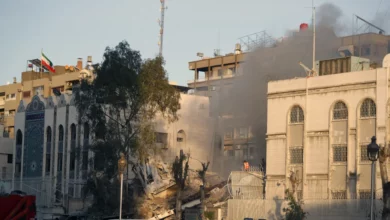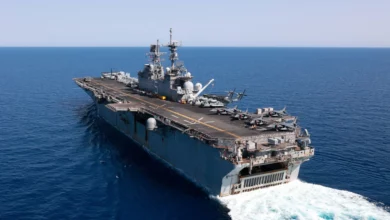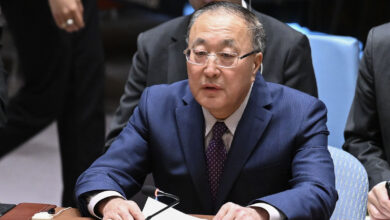
As the regime-toppling revolutions in the Arab world move into their second spring, identifying a unified opposition front for the Syrian uprising is growing more convoluted.
With the death toll mounting well into the thousands, the international community continues to take tentative steps with regards to how to end the killing, and where to stand with regards to out-and-out regime change. The semi-organized and armed fighters on the frontlines are not always the same players representing the uprising abroad.
The Friends of Syria conference Tunisia, which included representatives from 60 Arab and Western states, acknowledged on Friday the Muslim Brotherhood-led Syrian National Council as the revolution’s representative abroad. With the reported Qatari funding of the SNC along with their organization and prominent presence on the world arena, many view them as playing a prominent part in Syrian politics for at least the duration of the revolution.
Based in Istanbul, Turkey, the SNC is a coalition of Syrian opposition parties formed in August to combine forces during the uprising against President Bashar al-Assad. Despite gaining recognition at the Friends of Syria Conference, the council did not initially form with the stated aim of representing the revolution abroad.
The SNC consists of representatives from various opposition parties and movements including the Muslim Brotherhood of Syria, the exiled Damascus Declaration, Kurdish dissidents, local action committees, and other groups. Brotherhood representatives make up the lion’s share of the 150-strong council, while it is led by liberal Paris-based Syrian academic Burhan Ghalioun.
Since opposition has long been effectively illegal in Syria, many of these groups represent immigrant or exiled dissidents.
The Brotherhood’s leaders specifically have not ventured back to Syria for the past 30 years. In 1982, the government passed a law making Brotherhood membership a crime punishable by death. The law, known as Law 49, was enacted after the government’s shelling of the city of Hama — once a Brotherhood stronghold — that left 30,000 to 40,000 dead. Assad’s father, then-President Hafez al-Assad, ordered the attack to initiate a purge of Brotherhood influence and a Sunni-led movement against his rule. The family’s Alawite sect makes up around 10 percent of the country’s population.
But regardless of this history, their lack of presence on the ground is costing the SNC and the Brotherhood support in Syria and prompting criticism from opposition groups within the country.
“They have no bases on the ground in Syria and are not participating [as a group in the resistance]. They are trying through the SNC to ride the wave of the revolution into power,” said Paris-based Syrian journalist Fahd al-Masry, who is also the spokesperson abroad for the Free Syria Army.
Others are not as skeptical and say the Brotherhood is doing what it can to support the uprising, given the forced exile of its members for the past three decades.
“It would not be fair to say that they [the Brotherhood] do not represent a present force on the ground,” said Moatez Thaalab, the secretary general of Karama movement, a moderate Islamist Syrian resistance group that is part of the SNC. By his own estimates, the Brotherhood does not represent more than 10 percent of the on-the-ground resistance.
Many revolutionaries in Syria have also said that, unlike in Egypt and Tunisia, the Muslim Brotherhood is absent among dissidents.
“It’s not that they are not active as an entity. But the Assad regime was actually successful in removing most traces of them. Right now, only revolutionaries are fighting in Syria. Opposition groups are riding the wave. But if people allow these groups to represent them, I have no problems with that,” said Rabei al-Junaidy, a PhD student at Azhar University in Damascus.
For Junaidy and Thaalab, the Brotherhood’s ascension on the political front is not offensive, given their exclusion and persecution in the country.
Along with often violent repression, the government’s continuous propaganda campaign against the Muslim Brotherhood may have affected public perception of the group.
“Unlike in Egypt and even Tunisia, Syrians had no positive Brotherhood examples to look to. It is unlikely that they can just appear, change public perception and take over elections,” Junaidy said.
During the early uprising, the Muslim Brotherhood announced it would support demonstrations. A Brotherhood observer in Damascus, Mohamed al-Shaqfa said the group aims to foster change in a non-violent way that will allow it to propose a moderate Islam as part of a platform that could compete in fair elections.
Until recently, a non-violent, reformist agenda has been the course chosen by the Muslim Brotherhood in Egypt and Tunisia.
But for Masry, the Muslim Brothers’ ascent through the SNC would be a blatant and unlawful usurpation of power, in a land where, as far as he’s concerned, they would have no chance of winning a popular election.
Speaking on behalf of the FSA, Masry says that the armed resistance is solely led by Syrian military defectors, and neighborhood militias formed to defend against military atrocities.
The Free Syria Army is considered the main resistance force fighting in Syria. This military group of army defectors produced a video in late June announcing the formation of the army while in Syrian uniform. The FSA accepts any defectors and joined with the Free Officers Movement. They claim to have 40,000 men in their ranks and are thought to be continuously recruiting when they conduct operations in urban or rural residential areas.
The FSA has become the recognized face of a loosely organized resistance, although many civilians have taken up arms independently of the military defectors. Despite having representation in France and elsewhere around the world, the Free Syria Army has not coordinated widely with the SNC. Observers say that the coordination within FSA itself is weak, making the group more of a loose umbrella to armed groups in the country.
Thaalab told Egypt Independent that the Muslim Brotherhood decided to provide material support to the armed resistance three months ago, when they announced a shift in their position with regards to armed fighting. Masry, on the other hand, insists that the Muslim Brotherhood is nowhere to be found among the resistance save for a few “sympathizers.”
Nonetheless, perhaps gaining power or support from the Brotherhood network worldwide, the group is beginning to have a greater influence on Syrian politics, from the outside.
“I don’t doubt that they are coordinating visions, but not strategies or resources,” Thaalab said. When Syrian Brotherhood members come to Egypt, they go visit the Egyptian Brotherhood’s governing council first, he said.
“The Brotherhood’s international branch has become too weak to coordinate in a centralized way on an international level. They don’t have the same personal allegiances, just similar organizational adherences,” said one prominent Brotherhood member who preferred to not be named, referring to the mechanics of the group’s international organization.
The Muslim Brotherhood in Egypt has expressed its support for the Syrian revolution and lately lent its voice to the Syrian Brotherhood’s support of armed resistance.
While the Friends of Syria conference acknowledged the SNC, critics from within the council complained about the group’s rather fragile position vis a vis the Syrian revolution. SNC and Brotherhood member Milhem al-Droubi expressed his dissatisfaction with the conference. He was especially displeased with some countries’ failure to provide material support to the armed resistance and the FSA, which would be an overture to more cooperation between the two entities.
The FSA and SNC have both lauded Saudi Arabia’s decision to pull out of the conference due to its “inactivity.” The Tunisia conference marked the Friends of Syria’s first meeting. Saudi Foreign Minister Saud al-Faisal said that humanitarian aid to Syria was not enough, insinuating that the kingdom would do more to directly aid Syrian resistance movements.
Droubi called the Saudi pullout a “positive withdrawal.”
“Hopefully this means that Saudi would more actively support the FSA, in providing military aid to the resistance and the FSA,” said Masry.
This also means that the Syrian Muslim Brotherhood may try to play a more hands-on role in working with the FSA if they can convince Saudi to provide arms and other direct aid. Up until now, even supporters of the SNC have been critical of the council’s role, as well as the Brotherhood’s, in supporting the revolution.
“They [the Brotherhood] were late in supporting the FSA and followed the Turkish policy on Syria, which was not was needed,” said Thaalab.
Turkey, while vocal on the need for change in Syria and regime change, is also opposes military action against the Syrian regime.
With all the difference in experience between the Syrian and Egyptian/Tunisian Brothers, the Syrian group is following the example its counterparts set of making their presence known on the relevant councils and diplomatic bodies representing their revolutions. The group has also played it safe, staying one step behind the front line by joining the armed resistance well after attacks by the Syrian military had escalated into daily mass killings.
This. according to Masry, is an indication that they are following the revolution instead of participating in it as true leaders.
However the political discussion about the role of opposition groups, as Junaidy said, may not be as important or relevant as the international community is making it out to be since, “our revolution is an entire people against a system, up until now, political opposition groups internally are not as important.”




